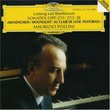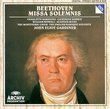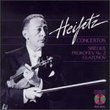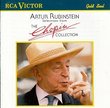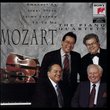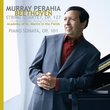| All Artists: Karol Szymanowski, Martin Roscoe Title: Karol Szymanowski: Piano Works, Vol. 1 Members Wishing: 0 Total Copies: 0 Label: Naxos Release Date: 6/6/1995 Genre: Classical Styles: Forms & Genres, Etudes, Sonatas, Historical Periods, Modern, 20th, & 21st Century, Instruments, Keyboard Number of Discs: 1 SwapaCD Credits: 1 UPC: 730099401623 |
Search - Karol Szymanowski, Martin Roscoe :: Karol Szymanowski: Piano Works, Vol. 1
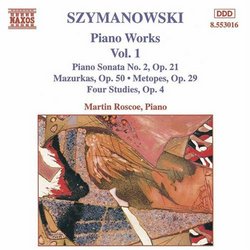 | Karol Szymanowski, Martin Roscoe Karol Szymanowski: Piano Works, Vol. 1 Genre: Classical
|
Larger Image |
CD DetailsSimilarly Requested CDs
|
CD ReviewsNEXT STOP...... SZYMANOWSKI....!!! Melvyn M. Sobel | Freeport (Long Island), New York | 01/03/2003 (5 out of 5 stars) "Karol Szymanowski [1882-1937], son of Poland and modernist kindred of Chopin, is well-served by Mr. Roscoe in this first volume (of three, so far) issued by Naxos of the composer's complete piano music, and is, as well, an exemplary introduction. Although I decry the scattering of integral sets of pieces (e.g. the twenty Mazurkas, Op. 50), and I'm sure Producer Gary Cole could have coordinated the works to CD intact, still (and just the same, as a good friend once ruminated), since Szymanowski's piano music doesn't appear to be overrunning the classical catalogue, we should be grateful for anything available. The opening four Op. 50 Mazurkas (all dedicated to Artur Rubinstein) are fetching and nicely nuanced in Roscoe's hands, especially No.'s 1 and 3, whose combined elements make a fascinating Chopin/Scriabin mix. The Metopes, Op. 29 bring tantalizing aural pictures from the world of Homer's Odyssey, and with it the wanderings of legendary hero, Odysseus. Szymanowski's exotic use of impressionism and mood recalls the obvious influence of Debussy and Ravel. The assimilation, however, is engrossing. Most attractive are the Op. 4 Etudes, especially the very Scriabinesque, and beautiful, No.'s 1 and 3. Chopin's muse hovers nearby as Mr. Roscoe sensitively coaxes every note. Sonata No. 2, Op. 21, running nearly twenty-nine minutes, is an entirely different affair. Often powerfully virtuosic, often tender, the work is quite like Rachmaninov in its scope, and quite superb, as well, on its own terms. The Naxos engineers have given Mr. Roscoe's performances faithful reproduction; likewise, the pianist has given the composer his due. [Running time: 66:44]" Naxos for the occasional hearer, Nimbus for the collector! I leisure-larry | 08/08/2006 (5 out of 5 stars) "If you are interested in the complete piano music by Szymanowski, you can choose between four single Naxos CD's with Martin Roscoe, or a 4 CD Set by Nimbus Records with Martin Jones. The Nimbus box costs a bit more than 4 x Naxos but with a free coupon code (virtual voucher) the prices end up equal, so price cannot matter. What does matter is the artist's performance, and the manner of the disc compilations. Roscoe needed 12 years (1994-2006) to complete the Naxos project and has won numerous awards and praise for it during that period, whereas Jones needed 1 year (1992-1993) only with no significant award; so objectively speaking, Roscoe's performance is 'better'..although there is nothing to criticize regarding Jones's perfect playing. In my crusty ears both performances sound very much alike, to be honest; so who plays should not matter either. Finally the most distinctive feature of the two releases is the compilation on each disc: Jones's is 100% chronological (op.1,3,4,8,10,14,etc.), so that you can find all(!) of the middle-Szymanowski on disc three; CD1&2 represent the early, and CD4 the late (CD4 has 100% the exact compilation as Marc-Andre Hamelin's recording on hyperion records!) composer. This makes listening to the CD's very very easy and comforting. In opposition, Roscoe seems to have mixed all operas arbitrarily on the discs and he even splitted the Mazurkas Op.50 and spread them on all four CD's. Strange thing to do! Sorry, i cannot detect any kind of logical order within the Roscoe release. You might like the element of surprise when listening to a Roscoe disc..but I find these illogical couplings with its arbitrary doses of early-middle-late Szymanowski rather irritating than enjoyable. It somewhat spoils the collector's edition *IMHO*. And that's maybe exactly the point of Naxos: Roscoe's CD's aim at the occasional listener who only wants *one* disc, representative for Szymanowski's oeuvre, and no matter which disc he chooses, it will always contain a similar dose of early, middle, and late. In our case, such devised marketing did not work for me! :P The booklet for Jones@Nimbus has 12 pages of true reading, excellent and detailed; the total times for his four CD's are 69.06, 66.06, 66.06, 67.34 (sum=4h29min); produced and copyright 1999. A last word on the music itself, if Bortikievich (Bortkiewicz) was the 'Russian Chopin', then Szymanowski must be called the 'Polish Scriabin^2': early-Szymanowski sounds like early-Scriabin, just with squared virtuosity and complexity; middle-Szymanowski sounds like late-Scriabin with double frenzy and intensity. So, if you enjoy Scriabin, you will like most of Szymanowski, bet?!" An auspicious start to an invaluable series G.D. | Norway | 02/11/2010 (5 out of 5 stars) "The first volume of Martin Roscoe's traversal of Szymanwski's piano works for Naxos is definitely an auspicious start to an invaluable series. Other pianists have perhaps taken a slightly more impressionistic approach and focused more on the shimmering atmospheres of the music, but Roscoe - while in no way eschewing the fantasy or magic - more than makes up for it by boldness and sweep. He also manages to create a more variegated sound world for this music than many of his competitors.
The second sonata must surely be one of the more technically challenging ones in the repertoire, and Roscoe, unfazed by the difficulty, is in general thoroughly convincing; wonderfully phrased and played with a deep understanding of the construction and melodic development of the music. The Naxos series (sensibly, I admit) spread his Mazurkas op. 50 over the four discs in the series - fabulous, stirring music, firmly based on folk music yet quite experimental in idiom (and sounding very little like Chopin, to which they by virtue of their format might be suspected to be indebted). Roscoe is in any case a well-neigh ideal advocate, realizing the brittle, mercurial textures yet never missing the dance-rhythms that form the spine of the music. The 1915 Metopes are masterpieces inspired by Szymanowski's study of Greek civilization - more specifically figures in low-relief on the pediment of an ancient Greek temple. The individual pieces are inspired by episodes from the Odyssey, and are pure magic (stylistically Debussy isn't too far away) - in particular the depiction of Nausicaa, where the wisps of legend and ancient magic and otherworldly drama takes on a more human warmth. The four studies are early works and indebted to Chopin and Scriabin; the first is imposing and bold, followed by a brief and quick second etude and the relatively well-known, melancholic third before rounding off with what is clearly a homage to Chopin. It is to Roscoe's credit that he is as convincing in all this music, despite the evolution of the idiom and language. He is also given a very clear and natural sound with great depth and clarity. Overall, this is a strongly recommended release that should be heard by anyone." |

 Track Listings (13) - Disc #1
Track Listings (13) - Disc #1

